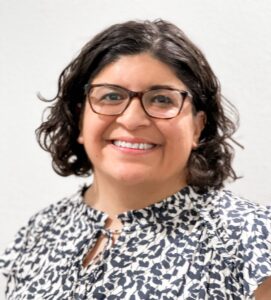
Executive Director of the Academic Advancement Center Mary Ann Lucero guides and supports strategic growth of the AAC and its programs: First-Generation University Initiative, Student Support Services, the McNair Scholars Program, Undocumented Student Services and the College Assistance Migrant Program. Alongside several priorities in these programs, Lucero is co-leading FGUI with Vice President for Student Affairs Blanche Hughes in coordinating universitywide vision and strategy to support the initiative’s purpose of validating and uplifting first-gen students’ experiences.
Colorado State University’s First-Generation University Initiative has undergone leadership restructuring to maximize FGUI’s operations and impacts.
How does the First-Generation University Initiative leadership restructuring relate to the recent Student Success leadership restructuring?
Lucero: The Student Success Initiative and First-Generation University Initiative are uniquely positioned to work in parallel to each other, and when opportunities exist work in tandem. At the core, first-generation success is student success, and advancing equitable educational pathways is first-generation success. I believe the restructuring of both has only strengthened CSU’s commitment to seeking educational outcomes that are resistant to perpetuating inequities.
What goals does FGUI aim to fulfill at Colorado State University?
Lucero: For me, the overall aspiration of FGUI would be to scale a cohesive strategy for supporting first-generation students and their families. CSU is uniquely positioned in that FGUI does not see the first-generation identity as a single identity but one that is experienced in tandem with other identities that profoundly impact the student experience.
We know that the first-generation experience is a lifelong one and does not end at graduation; rather it is an experience that follows us through our first professional experience. I believe that it is the responsibility of the institution to ensure CSU students are prepared to navigate these experiences in the best possible way. This includes how we support the student experience, how we engage in staff and faculty development, how we support advancement efforts, and how we engage and further research the first-generation experience across the intersection.
Under the new FGUI leadership structure, what are the roles of the various committees and teams, and how will this structure improve outcomes?
Lucero: The FGUI Strategic Leadership Team is comprised of a group of administrators, staff, and faculty who are charged with advancing a universitywide strategy that is grounded in an intersectional framework that seeks to examine the relationship between the first-generation experience and CSU practices. In addition to the strategic leadership team, FGUI includes both a steering committee and advisory. Both groups work in tandem to determine and execute FGUI priorities and strategy by setting direction, while also providing expert advice and recommendations.
A universitywide strategy cannot be done in isolation. Rather, each group works toward our shared goals of addressing the social, academic, and financial barriers that impact first-generation student success and increasing awareness and visibility of the first-generation experience.
What does it mean for CSU to be designated as a First Scholars Institution by the Center for First-generation Student Success, and what comes next for FGUI in this regard?
Lucero: In 2023 CSU was selected to become a First Scholars Institution, transitioning to the third of four phases of the Center for First-Generation Student Success’ First Scholars Network. I believe the invitation for CSU to continue onto the third phase is attributed to CSU’s ongoing commitment to support the first-generation community, which dates to 1984 when CSU became the first university in the country to offer scholarships that were specifically designated for first-generation students.
CSU and the Center for First-Generation Student Success work in tandem using the First Scholars theory of transformation model, which allows us to partner with an expert guide who offers guidance on developing a continuous improvement process, supporting us in scaling efforts that support first-generation student success at CSU.
By maximizing the guidance we receive from the Center for First-Generation Student Success and centering the intersectional experiences of first-generation students, CSU is uniquely positioned to serve as a leader in advancing efforts that seek to further first-generation success.
What is your history surrounding first-generation student success?
Lucero: First-generation student success for me is personal, similar to others. I was also the first in my family to attend and graduate with my undergraduate degree. But my personal experience did not end when I graduated; I’m also the first in my family to work toward a terminal degree, so I find myself navigating the first-generation experience in a similar way. While I have more capital to navigate my experience, it does not escape me that how I engage my experience from a place of family and culture is new but also beautiful at the same time.
The FGUI Strategic Leadership Team is comprised of a group of administrators, staff, and faculty who are charged with advancing a universitywide strategy that is grounded in an intersectional framework that seeks to examine the relationship between the first-generation experience and CSU practices. In addition to the strategic leadership team, FGUI includes both a steering committee and advisory. Both groups work in tandem to determine and execute FGUI priorities and strategy by setting direction, while also providing expert advice and recommendations.